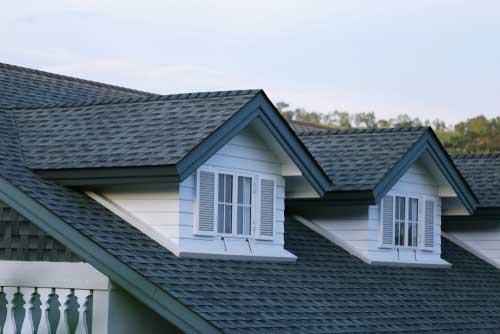Residential shingle is a popular material for roofing and what’s a house without a roof? Nothing. As residential roofing contractors in Atlanta will tell you, the rooftop is one of the essential parts of a residential building. A building with no roof loses its essence as a medium for protecting life and property.
When the material of a roof loses its ability to protect the house adequately, the result can be extensive damage and costly repairs. Thus, hiring the best roofing company for all roofing concerns becomes essential.
Roofs play a vital role in protecting your residence from the various elements of nature, but they can increase expenses when they are not energy efficient. In addition, on a sunny day, the roof can become dangerously hot.
This is due to the roof absorbing sunlight and converting it to heat. Some of the heat is emitted back into the atmosphere, and others transfer into your home. Therefore, using an energy-efficient shingle for your roof is essential as it cools the house and reduces energy use and bill.
Understanding Roofing Shingles
Are you stuck trying to decide what roofing style to use for your residence? Then, let’s discuss roofing shingles. Shingles are a thin, rectangular piece of building material with the tail end thicker than the other.
They are primarily used for roof coverings on houses and, other times, as siding. Shingles are attached in overlapping rows or courses, meaning that each one meets the other at a point. For this to occur, your Atlanta roofer lays shingles from the bottom of the roof up to the peak.
There are a variety of residential shingles available on the market. Some of them include:
- Asphalt shingles
- Metallic roof shingles
- Solar shingles
- Wood shingles
- Slate tile roofing shingles
- Architectural shingles
Roofing and Energy Efficiency
Roofs, in general, either release or absorb light energy directly from the sun. Depending on the material, the rooftop may absorb more heat from the sun than it reflects. As a result, the light energy is converted to heat, raising the interior temperature.
Traditional roofing materials are not effective at reflecting light away from the house. Consequently, residents have to resort to air conditioners during the summer months. This causes a spike in energy consumption and ultimately leads to increased energy bills.
Roofing manufacturers identified this problem and sought a solution – energy-efficient roofing. These roofing materials with the ENERGY STAR label possess a high degree of reflectance. This means that they reflect sunlight more than they absorb it.
The Solar Reflectance Index (SRI) and Cool Roofing Rating Council (CRRC) ratings are standards used to measure the emittance and reflectance of roofing shingles. The scale ranges from zero to a hundred (0-100).
What Makes Residential Shingle Roofs Energy Efficient?
Your choice of residential shingle determines how much heat the roof absorbs or emits. If you’re replacing your old roof or getting a new one, consider purchasing a material that is energy efficient.
Each variety of energy-efficient residential shingle has a distinct appearance and set of properties that may be more appropriate for a specific climate. For example, some roof types perform better in cooler climes, while others do better in hot, dry climates.
Below are different types of residential shingle and what makes them energy efficient.
-
Asphalt Shingles
Asphalt shingles are the most frequently used roofing material in Atlanta, Georgia. This is because of their affordability and ease of maintenance. However, in your search for energy-efficient asphalt shingles, it is vital to remember that some asphalt shingles on the market are not considered energy efficient. There’s a big difference between the two types.
The energy-efficient shingles are made with solar-reflecting granules that lower the SRI rating and extend the roof’s lifespan by keeping its temperature low. Traditional asphalt shingles that lack these granules can be 100 degrees hotter. The heat transfers into your attic and raises the temperature of your home.
Another essential factor to note when deciding what to buy is the color. For example, asphalt roofing shingles with a lighter color will do better than the darker ones.
-
Metal Roofing Shingles
Metal roofing shingles are the most energy-efficient roofs for residential purposes. They can last for half a decade, and they require little maintenance.
They owe their energy efficiency to the fact that they are highly reflective. This is because so much of the solar energy coming from the sun bounces back off the roof.
A metal roof can save a building owner as much as 20% in their cooling energy costs. In addition, manufacturers lower energy production at the power plants, reducing greenhouse gases emitted in the production process. Metal roofing shingles can also be coated to give them a higher efficiency rating.
-
Tile Roofs
Tile roofs are also a solid energy-efficient roof choice recommended by residential roof contractors in Atlanta. They are made from clay, slate, or concrete. Also, tile roofs are pre or post-treated (if you already installed them) with reflective coatings to maximize heat reflectivity.
Tile roofs are perfect for insulation since air can circulate easily under the tiles. As a result, it conserves energy during warm and cold weather.
-
Solar Shingles
Solar shingles are made of flat photovoltaic sheets that replace or overlay the existing shingles on a roof. It is the most innovative energy-efficient option because instead of reflecting the solar energy it absorbs, it converts it to electrical energy.
Residential Roofing Contractors in Atlanta Explains the Benefits of Energy Efficient Shingles
A lot of people are very uncomfortable when the weather becomes scorching hot. Apart from ensuring a cooler interior, energy-efficient shingles extend the lifespan of your roofs. This is because of the reduction in depreciation due to heat absorption.
Other benefits include:
- Reduction of energy bills. Using energy-efficient shingles reduces the need for cooling systems in the home. This means that you can reduce the budget for energy bills and free up money for other expenses.
- You have access to the government’s energy efficiency incentives. For example, the Department of Agriculture and the Internal Revenue Service (IRS) offers tax reductions for energy-efficient residences.
- Energy-efficient roofs extend the lifespan of your roof and HVAC.
- They also add resale value to your property.
Contact the Best Residential Roofing Contractors in Atlanta Today!
The advantages of using energy-efficient residential shingles are a handful. However, these advantages can be quickly erased if the roof is installed poorly. Therefore, hire only the best residential roofing contractors in Atlanta.
At Atlanta Roofing, our roofers have vast knowledge and experience handling residential roofs. Therefore, we know just the suitable roofing material for your home. All you have to do is call us today for a FREE quote from our Atlanta roofing contractors.


